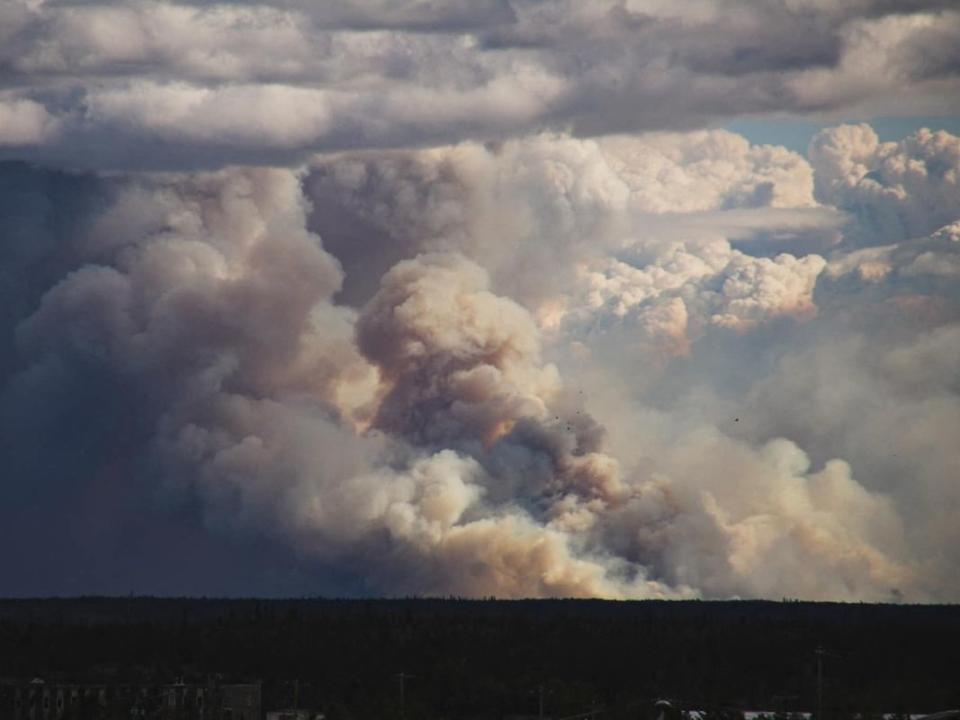Miners near Yellowknife suspend drill programs, close offices as wildfires threaten region

Miners near Yellowknife have been forced to suspend exploration drills, close offices and contact insurance companies for potential damage claims as wildfires threaten the Northwest Territories.
Thousands of residents have left the capital since Aug. 16 when the government asked people to evacuate due to the advancing fire.
Vancouver-based Gold Terra Resource Corp. said it suspended its drill program at the Yellowknife gold project, about 10 kilometres from the capital.
“Safety first for all employees and Yellowknife residents for the time being, as we wish Yellowknife residents a safe evacuation,” chief executive Gerald Panneton said in a statement on Aug.17.
Another Vancouver-based junior miner, Sixty North Gold Mining Ltd., cited a satellite image from Aug. 15 and said the fire had gone through its Mon gold property, located about 40 kilometres north of Yellowknife.
“The company has contacted its insurance company to advise them of a potential claim,” the company said in a statement. “With Yellowknife and the Northwest Territories having states of emergencies declared, and other priorities for aircraft, it is not possible to visit the Mon Project at this time to assess potential damage.”
Similarly, Vancouver-based Li-FT Power Ltd., which is developing the Yellowknife Lithium Project, said it was suspending operations due to smoky conditions that are interfering with its drilling operations.
This year has been the worst wildfire season, Canadian wildfire officials said last week. Prime Minister Justin Trudeau attributed the increasing intensity of wildfires to climate change and warned the situation could worsen if steps aren’t taken to reduce the country’s dependence on fossil fuels.
Climate change is the third-biggest threat to the mining industry behind geopolitics and environmental, social and governance (ESG) concerns, according to a survey conducted by Ernst & Young Global Ltd. last year.
Theo Yameogo, head of EY’s mining practice in Canada, believes that risks due to the impacts of changing climate conditions could play a key role in assessing the value of mining projects in the future.
Analysts generally consider several factors ranging from environmental concerns to geopolitical issues alongside the financial feasibility of operating a mine before assessing the value of a project or company. Risks linked to climate change, however, aren’t usually measured.
Some of N.W.T.’s bigger mines, which primarily produce diamonds, are still operating since they are a safe distance away from the wildfires. But not all their employees are working because many of them live in areas that have been affected by the wildfires.
“We are offering flexibility and support to our employees who have been evacuated or who need to be near their home or families wherever possible in the current context,” a spokesperson from Rio Tinto Ltd. said in a statement.
The mining giant runs the Diavik diamond mine, about 300 kilometres northeast of Yellowknife, and is donating $250,000 to support wildfire response efforts.
“At this time, operations are able to continue safely at a reduced capacity at Diavik, and we continue to evaluate our personnel needs,” the spokesperson added.
The De Beers Group said operations at its Gahcho Kué and Snap Lake mines, located about 200 kilometres from Yellowknife, are continuing.
“While both sites are more than 200 km away from Yellowknife and are not threatened by wildfire, the territory is home to more than 200 De Beers Group employees, many of whom live in the impacted communities,” the company said in a statement.
It added that it was working to support its employees affected by the evacuations.
• Email: nkarim@postmedia.com

 Yahoo Finance
Yahoo Finance 